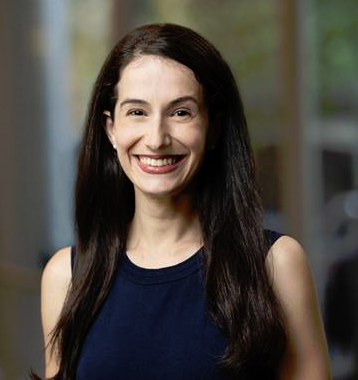Sarah Lieber, MS, MD
Assistant Professor, Hospital for Special Surgery
Sarah’s KL2 research explores aging in Systemic Lupus Erythematosus. Despite improved survival in SLE, few studies have focused on the increasing number of older adults living with SLE. The overarching goals of this study are: 1) to identify the prevalence of key geriatric syndromes, namely frailty, cognitive impairment, and fall-related injury, in older adults with SLE and to evaluate their relationship with measures of healthcare utilization and 2) to elicit the individual concerns and experiences of older patients with SLE and their treating rheumatologists.
KL2 Research Mentors:
Lisa Mandl, MD, Assistant Research Professor, Rheumatology, Hospital for Special Surgery
Iris Yolanda Navarro-Millan, MD, Assistant Professor, Medicine, Weill Cornell Medicine
Cary Reid, MD, PhD, Director, Medicine, Weill Cornell Medicine.

Veronica Rotemberg, MD, PhD
Assistant Professor, Memorial Sloan Kettering Cancer Center
For her KL2 research, Veronica investigates improving clinician melanoma diagnostic accuracy using artificial intelligence. To better understand how AI can assist the clinical diagnosis of melanoma, we propose that clinician diagnostic accuracy for melanoma can be improved with optimized interface design and open-source melanoma detection AI for clinical decision support. This study, performed on all lesions selected for biopsy at a high-volume skin cancer referral clinic, will guide future randomized controlled trials to determine clinical implementation of AI for melanoma diagnosis, and will develop a pipeline for future studies of dermatology AI applications generally.
KL2 Research Mentors:
Olivier Elemento, PhD, Professor, Physiology and Biophysics, Weill Cornell Medicine
Michael Marchetti, MD, Clinical Director, Dermatology, Memorial Sloan Kettering Cancer Center
Milind Rajadhyaksha, MD, Assistant Member, Dermatology, Memorial Sloan Kettering Cancer Center

Thalia Salinas, MD
Instructor, Weill Cornell Medicine
Thalia’s KL2 research examines multimodal profiling for the noninvasive diagnosis of kidney allograft rejection. Kidney transplantation is the best treatment for most patients with end-stage kidney disease. However, patients who receive a kidney transplant may have complications that prevent them from having “one transplant for life”. One major cause of kidney transplant failure is rejection. We strive to solve this problem by inventing tests to identify kidney transplant rejection using noninvasive approaches.
KL2 Research Mentors:
Manikkam Suthanthiran, MD, Chief, Medicine, Weill Cornell Medicine
Iwijn De Vlaminck, PhD, Assistant Professor, Biomedical Engineering, Cornell University


